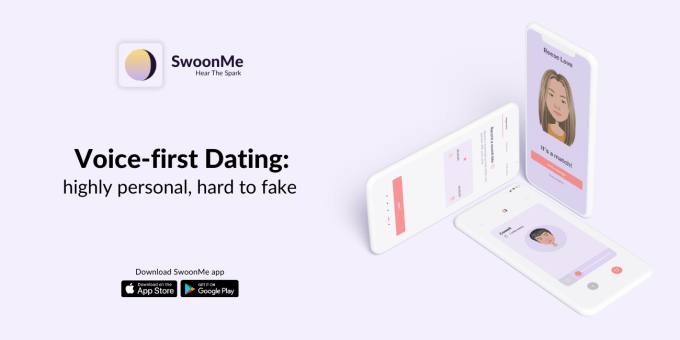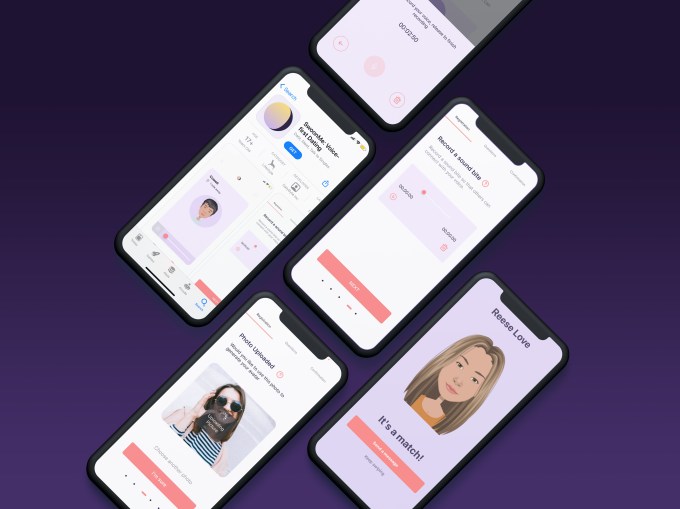APPS
SwoonMe uses avatars and audio for its ‘less superficial’ dating app
A new startup called SwoonMe aims to fix the problem with superficial dating apps, where users primarily make decisions based on how someone looks in their photos. Instead of swiping through profiles, SwoonMe’s idea is to use a combination of avatars and audio to encourage users to connect based on someone’s personality, not their appearance.
To use the app, you take a selfie which SwoonMe converts into an avatar. This is what others will see when they come to your profile. You then record a voice clip to tell others about yourself and what you’re looking for in a partner. You’ll also answer a few questions — like whether you’re looking for marriage or something more casual and what your love language is (e.g. physical touch, gifts, words of affirmation, etc.), among other things.
The result is that when people scroll through SwoonMe, they’re not making snap decisions based on what they’re seeing, but are rather making more thoughtful decisions based what they hear. When two people match, the app encourages them to continue to get to know each other using voice messages and soon, icebreaker games — not texting and photo-sharing. As they communicate, their avatar will slowly unveil their real photo.

Image Credits: SwoonMe
The idea for SwoonMe comes from Tanvi Gupta, a former Facebook product specialist who was involved with a number of high-profile products, including those that shipped in Messenger and in Instagram Direct, such as Messenger reactions, a Messenger redesign, chat heads on Android, and more. This experience taught her a lot about launching new products built from scratch, and helping them to find product-market fit, she says.
But Gupta decided to build SwoonMe because of her own personal struggles with modern-day dating apps, where men who messaged her immediately wanted to share selfies and meet her without having read anything on her profile.
“The dating world always felt super-indexed on looks, given the proliferation of apps like Tinder and Bumble,” Gupta explains. “And what I felt was they were not solving my personal need for somebody who wants to connect for a long-term relationship,” she says.
Gupta began work on SwoonMe during the pandemic, when the market was hungry for new ways to connect people online — a trend that had led to the launch of audio apps like Clubhouse and, later, its many clones. The founder says she was also inspired by Clubhouse, as it demonstrated the potential in audio-based social networking, including how it could be used for more personal connections.
“Platforms like Clubhouse have shown that taking video and looks out of the equation allow people to lean into actual topics,” Gupta says. “It creates new levels of intimacy and interaction, and we’re basically trying to capture this with SwoonMe, but in the dating world.”
Though SwoonMe isn’t necessarily limited only to people looking for relationships, it may initially appeal to that demographic because it requires a bit more time and focus to listen to soundbites and engage in audio-based messaging. This experience would be more likely to attract someone who is taking dating more seriously, not someone in search of a quick hookup or causal connection.

Image Credits: SwoonMe
SwoonMe is not the first social app to use avatars instead of photos, however. Avatar-based social discovery apps have been popular in other markets in Asia and in Brazil, but have yet to see broad, mainstream adoption in the U.S., particularly in the dating market. That may soon change, though, as Tinder parent Match Group this year acquired Seoul-based social app maker Hyperconnect — its biggest acquisition ever at $1.73 billion. AR-powered avatars are a part of the app portfolio that came with the deal.
The startup is also not the first dating app to take the idea of the “face reveal” — a somewhat gimmicky concept popularized by online creators — into the world of dating. There are a number of voice-based apps on the app stores today, which have seen varying degrees of success.
In February, for example, an app called Jigsaw raised $3.7 million for its own so-called “anti-superficial” dating app that places puzzle pieces over users’ faces which can only be removed after a pre-set amount of in-app engagement. But in Jigsaw’s case, the puzzle pieces were to be applied over full body photos, and it had banned selfies. That means the app was doing the opposite of what it proposes. Instead of encouraging daters to ignore images, some users were likely making decisions based on what someone’s body looked like in their photo with their face removed. That’s even worse. (After expressing my concerns to Jigsaw and declining to cover them, the startup told me it ended its selfie ban and now accepts a wide range of imagery.)
Gupta also feels strongly that women, in particular, deserve a different way to meet people that’s not about their looks alone.
“As a female, one of the main drivers behind founding a company like SwoonMe, which is audio-first and not photos, is because I personally am tired, and have been tired, of being objectified by men…We’re living in the 21st century and I am done with that. I want someone to like me because of my personality, because of my voice, because of what I bring into a relationship,” she says. “Sure, physical attraction is important, but that is not the only thing,” Gupta adds.
As it turns out, there’s demand for a less superficial dating app from men, too. In fact, SwoonMe currently has more male users than female at present. The app, to be clear, is open to all gender identities and sexual orientations as the issues it aims to solve can impact everyone. It also offers an inclusive sign-up flow.
Though it’s too soon to report user numbers and growth, Gupta says the app has “a good number” of early testers and they’ve been able to get solid user feedback so far.
The bigger question for SwoonMe is whether or not it can attract people looking for real relationships, as many of those people avoid dating apps altogether. It’s also competing with a growing number of video-first dating apps, like Snack, aimed at Gen Z users who are more comfortable filming themselves thanks to their use of social media platforms like TikTok.
At launch, SwoonMe doesn’t generate revenue, but plans to add premium features if it reaches scale. Longer-term, the company would like to expand its platform beyond dating to help keep couples connected during their relationship, too.
SwoonMe soft-launched across both the App Store and Play Store for beta testing, but is today announcing its official launch. Currently, SwoonMe is targeting the dating markets of San Francisco and L.A., but is open to anyone who wants to try it.
The startup is a small team and currently working to raise $1 million in seed funding.

















